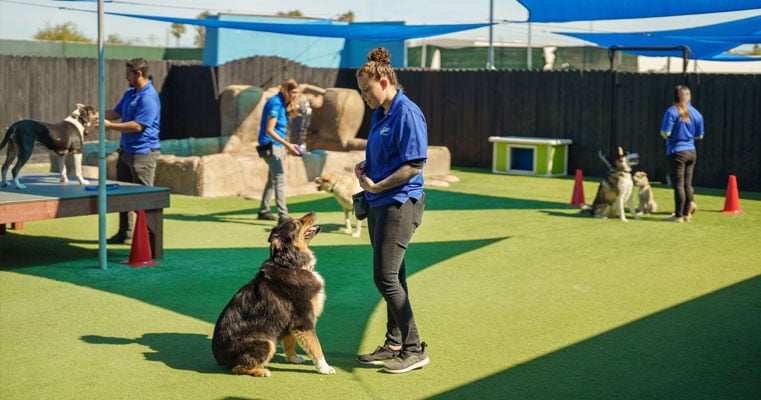Dog Training Myths Busted: What Really Works for Your Pet
Dog Training Myths Busted: What Really Works for Your Pet
Blog Article
The Ultimate Guide to Pet Training: Change Your Family pet's Behavior
Efficient canine training is necessary for promoting a harmonious partnership between animals and their owners. The ins and outs of canine actions and the application of structured training strategies play a crucial role in this process. By comprehending the principles of favorable reinforcement, consistency, and socializing, pet dog owners can navigate usual obstacles that develop during training. This guide not just intends to outfit you with the necessary devices to transform your canine's behavior however also invites you to check out exactly how these fundamental principles can lead to a much deeper connection with your animal. What may be the first action in this transformative journey?
Understanding Canine Behavior
Recognizing canine actions is important for efficient training and an unified partnership in between pet dogs and their proprietors. A dog's behavior is affected by a mix of genetics, setting, and experiences. Dog training. Acknowledging these factors allows owners to customize their training approaches to satisfy the private requirements of their pet dogs
Pet dogs connect primarily with body movement, articulations, and faces. As an example, a wagging tail can indicate excitement or joy, while a put tail may signal fear or submission. Observing these hints makes it possible for owners to react properly, reinforcing favorable habits and dealing with unfavorable ones properly.
In addition, recognizing the social framework of dogs can provide understandings right into their actions. Dogs are pack pets, and they thrive in an organized setting. Establishing clear boundaries and regular rules can protect against complication and promote a feeling of security.
In addition, acknowledging the all-natural reactions of canines, such as the desire to chase after or dig, is essential. These impulses can be redirected via suitable electrical outlets, such as play or exercise. By comprehensively comprehending these behavioral facets, owners can cultivate a positive training experience, ultimately causing a well-adjusted and loyal canine companion.
Necessary Training Strategies
Reliable pet dog training counts on a variety of crucial methods that can dramatically enhance the learning procedure for both the proprietor and the pet dog. One basic technique declares support, which involves satisfying desirable habits with treats, appreciation, or playtime. This approach motivates pets to repeat the actions that lead to positive results, fostering a relying on relationship in between the pet dog and proprietor.
One more key strategy is uniformity in assumptions and commands. Using the very same verbal cues and hand signals assists the pet dog understand what is required, decreasing confusion and advertising quicker understanding. Furthermore, developing clear borders and policies is critical for reliable interaction.
Socialization is additionally an essential part of training. Exposing dogs to various environments, people, and various other pets assists them create ideal social abilities and minimizes anxiousness in strange situations.
Lastly, persistence and timing are essential. Educating sessions should be frequent but short, making sure that the pet continues to be involved and responsive. By utilizing these essential techniques, proprietors can produce a positive and organized training experience that promotes etiquette and strengthens the bond with their canine companions.
Producing an Educating Schedule
Just how can a well-structured training timetable enhance a dog's understanding experience? A training timetable offers uniformity, guaranteeing that dogs get normal, focused guideline. This predictability assists canines recognize what is expected of them, strengthening their discovering and enabling much better anchor retention of commands and habits.
When developing a training schedule, it is necessary to think about the pet dog's age, type, and individual character. Young young puppies may benefit from shorter, more constant sessions, while adult canines might prosper with longer, less frequent training periods. Including a range of activities can also keep the sessions involving, stopping boredom and promoting enthusiasm for learning.
Additionally, scheduling training sessions at particular times of the day can aid strengthen a regimen. Pairing training with everyday walks or play can create a favorable association with discovering. It is also crucial to include time for reinforcement, such as deals with or praise, to compensate desired actions without delay.
Lastly, versatility is key. While uniformity is vital, being adaptable to the dog's state of mind or power degree can boost their discovering experience. A well-crafted training timetable inevitably lays the structure for reliable interaction and a more powerful bond between the pet dog and owner.
Usual Educating Difficulties
Despite having a well-structured training timetable, pet proprietors often come across numerous obstacles during the training procedure. One typical concern is variance in signs and commands. When multiple member of the family use various terms or tones, a dog may end up being overwhelmed, impeding its ability to discover efficiently.
Another constant obstacle is diversion. Dog training. Pets are normally curious creatures, and outside stimulations such as basics other pets, sounds, or people can divert their focus during training sessions. This requires owners to develop a controlled atmosphere or progressively present disturbances to enhance focus
Furthermore, varying energy levels can affect training end results. High-energy canines may have a hard time to calm down and concentrate, while more laid-back breeds might require extra inspiration to engage. Customizing the training approach to fit the specific pet's character is important for success.

Structure a Strong Bond
A solid bond in between a dog and its owner is essential for effective training and general well-being. Dog training. This connection promotes depend on, which is important for reliable interaction throughout the training process. When a dog really feels safe and linked to its proprietor, it is more probable to respond favorably to commands and cues
To develop this bond, consistency is crucial. Establishing a routine my site that includes regular feeding, exercise, and training sessions assists produce a feeling of stability. Additionally, positive support strategies, such as treats, praise, and play, reinforce preferred habits while reinforcing the psychological link.
Socializing is another essential aspect of bond-building. Revealing your dog to various environments, people, and other pets assists them really feel much more comfortable and certain, enhancing the bond with their owner. Taking part in activities together, such as strolling, playing fetch, or taking part in obedience training, promotes teamwork and mutual pleasure.
Verdict

Recognizing pet habits is crucial for efficient training and an unified relationship between pet dogs and their proprietors.Effective pet dog training counts on a variety of necessary techniques that can considerably boost the learning process for both the canine and the proprietor.Despite having a well-structured training schedule, canine proprietors frequently come across numerous challenges during the training process.In final thought, efficient pet training counts on a comprehensive understanding of canine behavior, the application of vital strategies, and the facility of an organized training schedule. By emphasizing positive reinforcement and consistency, canine owners can substantially improve their family pets' actions, inevitably ensuring a harmonious relationship and promoting the well-being of both the dog and its environment.
Report this page